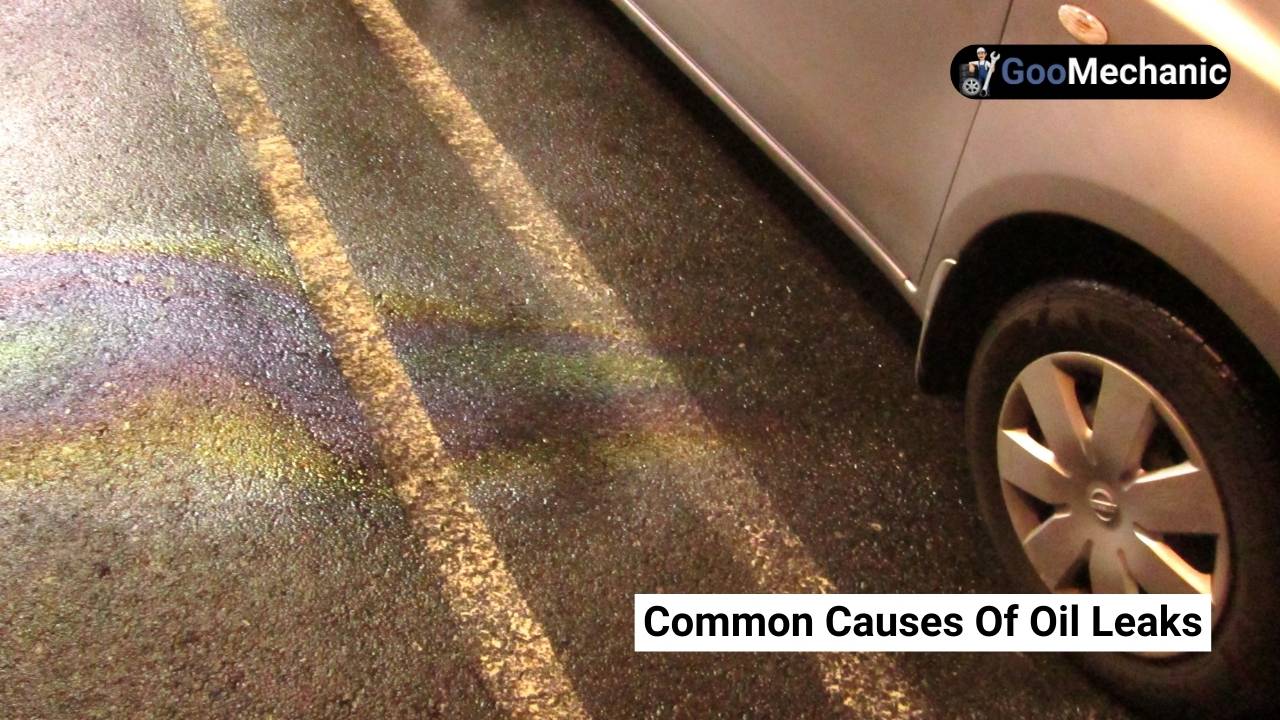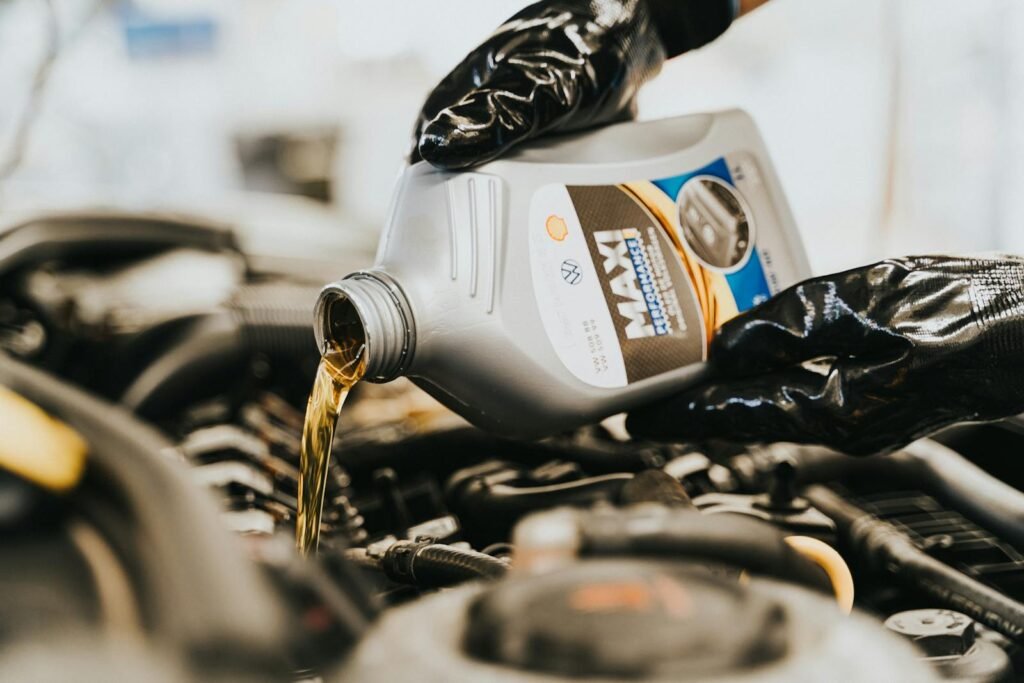Your car may leak oil when parked due to a damaged gasket or a worn-out seal. Another reason could be a loose drain plug or oil filter.
Oil leaks can be frustrating and concerning for car owners. Identifying the cause is crucial for addressing the issue effectively. Common culprits include damaged gaskets, worn-out seals, and loose drain plugs or oil filters. Leaks can lead to engine damage and environmental hazards if left unchecked.
Regular maintenance and timely repairs can prevent minor issues from becoming major problems. Always inspect your vehicle for oil spots where you park it. Early detection of oil leaks can save you from expensive repairs and ensure your car runs smoothly. Seek professional help if you’re unsure about the source of the leak.
Common Causes Of Oil Leaks

Understanding why your car leaks oil when parked is crucial. Identifying common causes helps in timely repairs. Below, we explore the most frequent culprits.
Worn Out Gaskets
Gaskets are seals that prevent fluid leaks in your car. Over time, gaskets wear out due to heat and pressure. When gaskets fail, oil leaks become common.
Signs of worn-out gaskets include:
- Oil stains under your car
- Burning oil smell
- Low oil levels
Regularly checking and replacing gaskets can save you from major repairs.
Damaged Oil Pan
The oil pan holds your car’s engine oil. A damaged oil pan often results from road debris or rough driving conditions. When the oil pan cracks or becomes punctured, oil leaks occur.
Watch for these signs of a damaged oil pan:
- Puddles of oil under your car
- Visible damage on the oil pan
- Frequent need to top off oil
Inspecting the oil pan regularly can prevent leaks and engine damage.
Signs Of An Oil Leak

If you ever wonder, “Why does my car leak oil when parked?”, it’s crucial to identify the signs of an oil leak. Recognizing these signs early can save you from expensive repairs. Below are some common indicators to help you understand if your car has an oil leak.
Oil Spots Under Car
One of the most obvious signs is finding oil spots under your car. These spots can appear on your driveway or garage floor. They are usually dark brown or black in color.
To determine if these spots are from your car, place a piece of cardboard under your car overnight. Check for fresh spots in the morning. If you see new oil spots, your car likely has an oil leak.
Low Oil Levels
Another sign is consistently low oil levels. Regularly check your car’s oil dipstick. If the oil level is low, and you need to refill it often, your car might be leaking oil.
Cars shouldn’t consume oil quickly under normal conditions. If you notice frequent drops in oil levels, it’s a clear indication of an oil problem.
Table: Common Signs Of Oil Leaks
| Sign | Description |
|---|---|
| Oil Spots | Dark spots on the ground under your car |
| Low Oil Levels | Frequent need to refill oil |
If you identify any of these signs, take your car to a mechanic. Addressing oil leaks early can prevent further damage.
Diagnosing The Leak
Seeing oil under your parked car can be alarming. Understanding why your car leaks oil is crucial. Let’s diagnose the issue with some simple steps.
Inspecting The Engine
Start by checking the engine for visible signs of oil. Open the hood and use a flashlight. Look for wet spots or oil stains around the engine. Check these areas:
- Oil filter
- Oil pan
- Valve cover gaskets
- Head gaskets
If you find oil in any of these areas, it may indicate a leak. Wipe the area clean and monitor it. If oil reappears, you have found the leak.
Using Uv Dye
If you can’t see the leak, use UV dye. This method is simple and effective. Follow these steps:
- Buy a UV dye kit from an auto parts store.
- Add the dye to your engine oil.
- Run the engine for a few minutes.
- Use a UV light to check for glowing spots.
The glowing spots will show where the oil is leaking. This method helps you find leaks that are hard to see.
Preventive Maintenance
Preventive maintenance is key to keeping your car in top condition. Regular checks and timely repairs can help prevent oil leaks. This not only saves money but also keeps your car running smoothly.
Regular Oil Changes
Oil changes are crucial for engine health. Old oil can lose its effectiveness and cause leaks. Most cars need an oil change every 3,000 to 5,000 miles. Always follow your car manufacturer’s guidelines.
Here is a quick checklist for an oil change:
- Park your car on a flat surface.
- Use the right type of oil.
- Replace the oil filter.
- Check for leaks after the change.
Checking Gasket Conditions
Gaskets are seals that prevent oil from leaking. They wear out over time and need regular checks. Common gaskets include the valve cover gasket and oil pan gasket.
Signs of a faulty gasket:
- Oil spots under your car.
- Burning oil smell.
- Low oil levels.
Here is a simple way to check gaskets:
- Open the car hood.
- Inspect the area around the engine.
- Look for oil stains or wet spots.
If you find any issues, consult a mechanic. Regularly checking gaskets can prevent bigger problems and expensive repairs.
Temporary Fixes

If your car leaks oil when parked, you need quick solutions. These temporary fixes can help until you see a mechanic. Below are two effective methods to stop oil leaks.
Using Oil Stop Leak Products
Oil stop leak products can be a quick fix. These products are additives you pour into the engine. They work by swelling the seals and gaskets, stopping the oil leak.
Follow these steps to use oil stop leak products:
- Buy an oil stop leak product from an auto store.
- Read the instructions on the bottle carefully.
- Pour the recommended amount into your engine oil.
- Drive your car for a few miles to let it circulate.
This method is simple and can provide a temporary solution. It helps reduce leaks but does not replace damaged parts.
Tightening Loose Parts
Loose parts can cause oil leaks. Tightening these parts can stop the leak. Focus on the oil pan bolts and valve cover bolts.
Use these steps to tighten loose parts:
- Check the oil pan and valve cover for loose bolts.
- Use a wrench to tighten any loose bolts.
- Be careful not to overtighten, as this can damage the parts.
Loose bolts are common causes of oil leaks. Tightening them can provide an immediate fix.
If your car leaks oil, these temporary fixes can help. Using oil stop leak products and tightening loose parts can manage the issue. Always consult a mechanic for a permanent solution.
When To See A Mechanic
Car oil leaks can be frustrating. Not only are they messy, but they can also indicate deeper issues. Knowing when to see a mechanic is crucial. Here are some signs to watch out for.
Persistent Leaks
If you see oil spots every morning, this is a persistent leak. A few drops might not seem serious, but they can add up. Over time, leaking oil can damage your engine. Persistent leaks can signal worn-out gaskets or seals. These are not minor issues and need professional help. It’s best to get this checked as soon as possible.
Strange Engine Noises
Sometimes oil leaks cause strange engine noises. If the oil level drops too low, the engine might start making unusual sounds. These noises can include knocking, ticking, or grinding. They often mean that parts of the engine are not getting enough lubrication. This can lead to serious damage.
If you hear these noises, check your oil level right away. If it’s low, top it up. But don’t stop there. Strange noises are a strong sign that you need a mechanic’s help.
| Sign | Action |
|---|---|
| Persistent Leaks | Visit a mechanic |
| Strange Engine Noises | Check oil level, then see a mechanic |
Keeping an eye out for these signs can save you from bigger problems down the road. Regular maintenance and quick action can keep your car running smoothly.
Cost Of Repair
Finding oil under your parked car can be frustrating. Understanding the cost of repair helps you plan and budget. Let’s break down the main costs involved.
Gasket Replacement Costs
Gaskets are common culprits of oil leaks. Replacing gaskets can vary in cost. The price depends on the type of gasket and car model.
| Gasket Type | Average Cost |
|---|---|
| Valve Cover Gasket | $100 – $300 |
| Oil Pan Gasket | $150 – $400 |
| Head Gasket | $1,000 – $2,000 |
Labor Fees
Labor fees add to the total cost of repair. These fees depend on the complexity of the job and the mechanic’s rate.
- Simple gasket replacement: $50 – $100
- Complex gasket replacement: $200 – $500
- Head gasket replacement: $1,000 – $2,000
Remember, the total cost combines parts and labor. Always get a detailed quote before proceeding with repairs.
Long-term Solutions
Experiencing an oil leak when your car is parked can be frustrating. Addressing this issue with long-term solutions ensures your car stays in top condition. Let’s dive into some effective strategies to fix this problem.
Engine Overhaul
An engine overhaul is sometimes necessary to fix persistent oil leaks. This process involves a thorough inspection and repair of your engine. It might include:
- Replacing worn-out gaskets
- Repairing or replacing damaged seals
- Fixing any cracked or broken parts
Overhauling the engine can eliminate multiple leak sources. Ensure a qualified mechanic handles this task for the best results.
Regular Inspections
Regular inspections help catch potential issues early. Schedule a routine check-up for your vehicle. Focus on these key areas:
| Component | Inspection Frequency |
|---|---|
| Engine Oil Levels | Monthly |
| Oil Filter | Every 3 months |
| Gaskets and Seals | Every 6 months |
Check for any signs of wear and tear. Early detection saves money and extends your car’s lifespan.
Regular maintenance prevents small issues from becoming major problems. Always use high-quality oil and filters.
Frequently Asked Questions
Is It Normal For A Car To Leak Oil When Parked?
No, it is not normal for a car to leak oil when parked. This indicates a potential problem. Check for damaged seals or gaskets and consult a mechanic. Regular maintenance can prevent leaks and costly repairs.
What Does It Mean When An Engine Leaks Oil When It Sit?
An engine leaking oil when it sits often indicates worn seals or gaskets. It can also mean loose bolts or damaged oil pan.
How Much Does It Cost To Fix A Car Leaking Oil When Parked?
Fixing a car leaking oil when parked can cost between $100 and $2,000. Costs vary based on the damage.
Why Is My Car Leaking Oil After Not Driving For Awhile?
Your car might leak oil after sitting due to deteriorated seals, gaskets, or oil pan issues. Check for damaged parts.
Conclusion
Understanding why your car leaks oil when parked is crucial. Regular maintenance can prevent costly repairs. Identifying leaks early ensures a smoother driving experience. Addressing the issue promptly can protect your engine and extend your car’s lifespan. Always consult a professional mechanic for accurate diagnosis and effective solutions.
Keep your vehicle in top shape.
